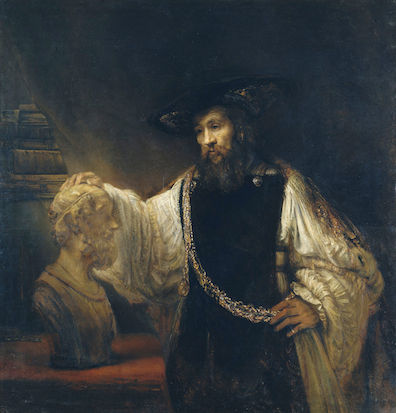Just as Nestor begins with references to an unnamed
"him" who turns out to be the ancient Greek general Pyrrhus, the first paragraph of
Proteus finds Stephen thinking of an unnamed
thinker: "Bald he was and a millionaire, maestro di
color che sanno." The Italian phrase, which comes from
Dante's Inferno, means "the master of those who
know" and refers to Aristotle. The other details (baldness and
riches) come from medieval biographical traditions about
Aristotle, and the term "diaphane" is a transliteration of the
ancient philosopher's Greek. Stephen seems to be preoccupied
with Aristotle ("he," "he," "his," "he") throughout this first
paragraph, but the philosopher's empiricism interacts with
more idealistic thoughts inspired by Jakob Boehme and George Berkeley.
In canto 4 of the Inferno, Dante is in Limbo, the
antechamber of Hell which houses those who lived without sin
but are not saved, in many cases because they lived before the
coming of Christ. In a particularly "honored" part of Limbo,
lit by bright light that seems a pagan approximation of
Heaven, Dante meets the great poets of antiquity (Homer,
Virgil, Horace, Ovid, Lucan) and then enters a castle where he
encounters many more virtuous pagans. One figure in particular
stands out: "When I raised my eyes a little higher, / I saw
the master of those who know, / sitting among his philosophic
kindred. / Eyes trained on him, all show him honor. / In front
of all the rest and nearest him / I saw Socrates and Plato."
In writing of Aristotle so admiringly, Dante is following the
lead of Thomas Aquinas, who
referred to Aristotle simply as the Philosopher. In A
Portrait of the Artist Stephen has revered Thomas
Aquinas. In Ulysses he turns to Aquinas' inspiration
and model, Aristotle. Nestor, Proteus, and Scylla
and Charybdis all find him musing on Aristotelian
ideas.
At the beginning of Proteus the subject is vision,
sight, "thought through my eyes." Against the
idealistic approaches of Boehme and Berkeley, who see the
objects of sight as "coloured signs" conveying an immaterial
meaning ("Signatures of all things I am here to read"),
Aristotle discusses sight as an avenue to understanding the
reality of physical bodies. In his treatise On the Soul,
as Gifford observes, the philosopher identifies color as the
distinctive object of sight. And in his supplementary treatise
On Sense and the Sensible he identifies the property
of diaphanousness (transparency) as something that inheres to
different degrees in all physical bodies and allows color also
to inhere in them. The idea seems to be that light passes
through bodies to varying degrees and bumps up against color
as a kind of limit to the transparency. From this analysis
Stephen draws the not very earthshaking (but amusingly
phrased) conclusion that Aristotle was a materialist: "Limits
of the diaphane. But he adds: in bodies. Then he was aware
of them bodies before of them coloured."
Soon, though, Stephen is reeling back into the mystical way
of understanding experience. He takes his own advice to "Shut
your eyes and see," but what he wants to see is the
apocalyptic disappearance of the created universe: "Am
I walking into eternity along Sandymount strand?"
This thought experiment fails, however, and empiricism wins
the day: "Open your eyes now. I will. One moment. Has
all vanished since? If I open and am for ever in the black
adiaphane. Basta! I will see if I can see. See
now. There all the time without you: and ever shall be,
world without end."
The phrase "world without end" is not only part of a Christian doxology
but also a fair description of Aristotle's understanding of
matter. In the Physics Aristotle argues that in
some form the world must have existed forever, with no
beginning in time, because all existent things (which he
understands as formed matter) come into being from some
preexisting matter, and to suppose that the matter itself came
into existence from preexisting matter involves one in an
infinite regress.
Six sentences later in Proteus Stephen will think
of the Christian idea of "Creation
from nothing," which contradicts Aristotle's conception
of eternally existent matter. But there is good reason to
suppose that Joyce is seriously advancing the Aristotelian
conception when Stephen thinks "world without end." The Linati
schema identifies the "sense" of the episode as "Prima materia
(ΠΡΟΤΕΥΣ)". Prima materia (an alchemical term
meaning first matter) is a concept whose origin is often
attributed to Aristotle, and by identifying it with PROTEUS
Joyce seems to be suggesting that eternally existing matter is
the stuff from which all the protean shapeshifting of life
emerges.


